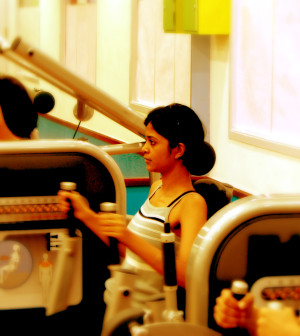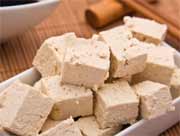- Double Mastectomy May Offer No Survival Benefit to Women With Breast Cancer
- Toxic Lead Found in Cinnamon Product, FDA Says
- Certain Abbott Blood Sugar Monitors May Give Incorrect Readings
- Athletes Can Expect High Ozone, Pollen Counts for Paris Olympics
- Fake Oxycontin Pills Widespread and Potentially Deadly: Report
- Shingles Vaccine Could Lower Dementia Risk
- Your Odds for Accidental Gun Death Rise Greatly in Certain States
- Kids From Poorer Families Less Likely to Survive Cancer
- Tough Workouts Won’t Trigger Cardiac Arrest in Folks With Long QT Syndrome
- At-Home Colon Cancer Test Can Save Lives
Soy Foods Don’t Seem to Protect Against Uterine Cancer: Researchers


There’s no evidence that soy foods protect against uterine cancer, a large Japanese study reports.
Soy foods contain isoflavones, a plant-derived estrogen that some research suggests may be protective against cancer. But previous studies into how soy foods may affect uterine (endometrial) cancer risk have yielded inconsistent findings.
This new study included more than 49,000 Japanese women who were surveyed twice in five years about their diet, lifestyle, medical history and food consumption of eight soy food items, including miso soup, tofu and soy milk.
After five years, 112 of the women were diagnosed with uterine cancer. But the researchers found no association between higher consumption of soy foods and a lower risk of uterine cancer, according to the study, which was published June 18 in BJOG: An International Journal of Obstetrics and Gynaecology.
The researchers noted that the women who consumed more soy foods also ate more fruit and vegetables and tended to be older, more likely to have a history of diabetes, and less likely to be current smokers or to consume alcohol or coffee.
“Our study found that intake of soy and isoflavones were not associated with the risk of endometrial cancer,” study co-author Dr. Motoki Iwasaki, of the National Cancer Center in Tokyo, said in a journal news release.
“Although the incidence of endometrial cancer is much lower in Asian countries, the incidence rate has been increasing. We also know that the consumption of soy foods among Japanese people is very high,” Iwasaki noted.
“We need further studies with a greater number of cases to verify these findings and add to the research base,” the researcher concluded.
John Thorp, journal deputy editor-in-chief, added in the news release, “Confirmation of these results needs further investigation and larger, more diverse studies.”
More information
The U.S. National Library of Medicine has more about uterine cancer.
Source: HealthDay
Copyright © 2024 HealthDay. All rights reserved.










